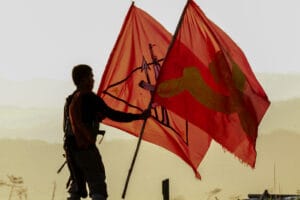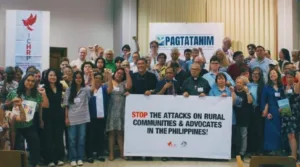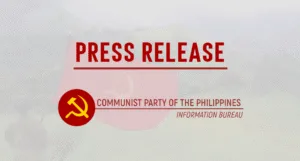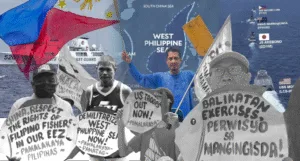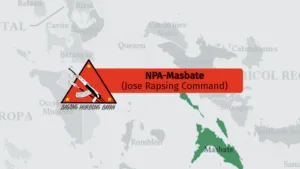Communist Party of the Philippines | June 30, 2017
Download Ang Bayan [English»] [Filipino»]
 The Duterte regime’s key economic, social, security and foreign relations policies are basically a continuation of past measures which perpetuate the oppressive and exploitative semicolonial and semifeudal system. The US imperialists and the ruling big bourgeois compradors, big landlord class and bureaucrat capitalists remain the dominant forces in his government.
The Duterte regime’s key economic, social, security and foreign relations policies are basically a continuation of past measures which perpetuate the oppressive and exploitative semicolonial and semifeudal system. The US imperialists and the ruling big bourgeois compradors, big landlord class and bureaucrat capitalists remain the dominant forces in his government.
The crisis of the ruling system continues to worsen in the first year under the Duterte regime as it fails to fulfill its promises of change. It has unleashed wars of death and destruction as it adopts ironfisted tactics and fascist methods to secure its rule and serve the interests of the ruling exploitative classes and foreign big capitalists.
The Duterte regime is proving itself to be fundamentally no different from previous regimes in terms of subservience to foreign imperialist-imposed economic and security policies. It is bound to face the Filipino people’s outrage for perpetuating foreign subservience, feudalism and fascism and refusing to heed the demand for basic social, economic and political reforms.
Failed promises of change
Rodrigo Duterte has zero to show to buttress his claims of being a Leftist and socialist. There are no serious policy reform in the social, economic and political fields. He has turned his back on his promise of sweeping changes made during the 2016 elections. He has continued the neoliberal policies of the past three decades which perpetuates the exploitation and oppression of the people.
The broad masses of workers, peasants, unemployed, students, teachers and other small professionals are increasingly disgruntled. They continue to suffer from landlessness and landgrabbing, worsening forms of feudal and semifeudal exploitation, rising costs of living, acute unemployment and job insecurity, low wages, natural and man-made disasters, epidemics and lack of affordable and quality social services. Millions of students continue to be burdened by tuition increases and rising costs of education.
To the great dismay of workers, not only has Duterte failed to fulfill his promise to end contractualization, he has even reinforced the policy by setting regulations for it. Workers’ wages remain extremely low. Workers continue to suffer from dangerous working conditions leading to fires and other accidents.
Contrary to the peasant clamor to stop land conversions, he is pushing for the conversion of thousands of hectares of land, particularly in Mindanao, to become oil palm plantations. He has given scant support to measures to distribute land at Hacienda Luisita and gave mere token support to the struggle of the Lapanday farmers to occupy their land. Declarations of support for free land distribution has served only as soundbytes. He has perpetuated the policy of rice importation to the detriment of local peasants and the general public.
The economic policies of the Duterte regime are a continuum of the neoliberal policies of the past three decades plus. These are geared at achieving superficial high growth rates by drawing in increased foreign investments. As before, the Duterte regime’s policies perpetuate the export-oriented and import-dependent semimanufacturing and backward agrarian economy.
Duterte’s 10-point economic agenda perfectly dovetails with the economic policies of the previous Aquino regime. As before, the Duterte regime’s “economic growth” is hinged on foreign investments and calls for further liberalizing investment policies by removing constitutional restrictions, building infrastructure for rapid transport lines from the ports to the labor enclaves and increasing government revenue by imposing additional tax burden on the people.
Duterte’s economic planners have announced the start of a so-called “golden age of infrastructure” anticipating large amounts of loans from China and Japan. These infrastructure projects, including the Manila-Clark and Mindanao railroads as well as land reclamations in Manila and Davao port areas, primarily aim to pave the way for rapid transport of raw materials as well as semimanufactures from labor enclaves to the international export market.
The Duterte regime has announced plans to spend $8 trillion over the next five years, funded largely by foreign loans, mostly from China. Such a plan will make the country a virtual debt slave, vulnerable to economic, political and military impositions of China. This situation will be no different from how the country was forced to comply with US-IMF-World Bank imposed conditionalities throughout the Marcos and post-Marcos regimes after levels of foreign debt soared to unprecedented heights.
Duterte’s tax reform plan, a rehash of old proposals, is set to impose additional tax burdens on rented homes, petroleum products, sweetened drinks and salt aimed to generate at least $600 billion to service the loans for the planned infrastructure binge.
Strongman rule: widespread death and destruction
Duterte has increasingly employed strongman tactics to establish and reinforce his rule. He has displayed all-out ruthlessness believing he can use his large number of electoral vote as license to attack the people.
He has abetted soldiers and police to unleash fascist violence with impunity. He has pampered the AFP and PNP with perks and benefits. He has appointed close to 60 former military and police generals and officers to key positions in his government. He relies primarily on the reactionary state’s armed forces to perpetuate his rule.
In less than a year, he has launched three wars: a so-called “war against drugs” (Oplan Tokhang and Oplan Double Barrel) which is directed more against the poor; an all-out war of suppression (Oplan Kapayapaan) against the people’s national democratic cause; and a war against the Moros marked by the AFP siege and destruction of Marawi City (under the state of martial law in Mindanao).
In utter contempt of the Filipino people, Duterte has repeatedly praised the Marcos dictatorship and military rule in the vain hope of making his plans to establish himself as a Marcos-style strongman acceptable. As a political quid pro quo, he gave the Marcos family the long-desired hero’s burial for the dictator in November 2016, thus completing the Marcoses’ political rehabilitation.
Duterte’s “war against drugs” is a virtual campaign of mass murder which has resulted in the killing of more than 8,000 people, mostly poor users and street peddlers. Community social activists have also been targeted. They have been killed by police agents in supposed arrest operations; and by death squads reportedly run and financed by the police. Duterte is using the anti-drug war to make it appear that killings and fascist methods are necessary and ideal in addressing social problems which are rooted in poverty. Meanwhile, big drug lords including Peter Lim and others known to be close to Duterte remain untouched.
The Duterte regime deployed its armed units and occupied at least 500 barangays despite a GRP unilateral ceasefire from August 2016 to February 2017. Subsequent to the termination of the unilateral ceasefire declaration, defense and security officials of the Duterte regime declared an all-out war on February 7, 2017. In line with this, Duterte has ordered the AFP to “flatten the hills” through aerial bombings and shelling. Cases of human rights abuses are on the rise.
Since March, the AFP has carried out around 30 aerial bombardment campaigns in various parts of the country (outside Marawi City), destroying rice fields and forested areas near communities which the AFP suspect to be supportive of the revolutionary movement. At least 20,000 people have been forced to evacuate as a result of such bombardments. There are at more than 70 cases of extrajudicial killings (more than one a week), victimizing mostly activists and organizers among the peasants and national minorities.
Duterte has completely set aside his repeated promise of releasing all political prisoners through a general amnesty proclamation. Around four hundred remain detained. This number continues to rise as the reactionary state forces target and arrest organizers of people’s organizations in line with the Oplan Kapayapaan war of suppression.
On the pretext of a “rebellion” by armed Moro groups in Marawi City, Duterte imposed martial law on the entire Mindanao island on May 23. He whipped up Islamaphobia combined with an all-out psychological offensive to draw support for his martial law declaration from among the reactionaries as well as the conservative and politically backward sections of Philippine society.
He has practically served Marawi and Mindanao on a silver platter for the AFP. For more than a month now, the AFP has been on a rampage of rape and plunder. On Duterte’s orders, the AFP has carried out non-stop bombardment of Marawi reducing the city to dust. Duterte’s big business friends are now eyeing to cash-in on planned government infrastructure building. The AFP’s siege and destruction of Marawi has resulted in a severe humanitarian crisis causing grave sufferings to hundreds of thousands of Moros. It is reigniting their widespread armed resistance even as Duterte seeks to draw the MILF and MNLF to new arrangements of “autonomous rule” under the GRP.
Duterte has repeatedly hinted of plans of imposing Marcos-style martial law nationwide. This is an overt threat against his rivals who seek to unseat him. Duterte’s political mob are calling for extending and expanding martial law to enable the ruling regime to railroad these infrastructure projects and ensure that they will bag the contracts and pocket the percentages.
Even prior to martial law, Duterte has brandished his presidential powers combined with the campaign of killings to suppress and threaten his political opponents. Eschewing all legal processes, he locked-up archrival Leila de Lima on drug charges completely disregarding her assertion that she is covered by the Sandiganbayan and not by lower criminal courts. Her detention serves as an example against other senators, congressmen and thousands of other local government, police and military officials who Duterte claims to be listed in his thick collection of drug dossiers.
His broadsides at the Aquino-allied oligarchs have merely served as a veneer to conceal the same rotten oligarchic and dynastic style of rule of his own retinue of hangers-on from among the ruling economic and political elite. Duterte has, so far, maintained supermajority control of the House of Representatives with promises of shares in the projected government contracts.
Factional conflicts within the ruling classes are bound to intensify as US imperialism maneuvers to maintain its dominance. By launching vicious attacks against his rivals among the ruling elite, Duterte has made them ever more determined to unseat him through every possible means including a US-supported coup or junta.
Duterte can counter with a palace coup through a declaration of a Marcos-style martial law. He can most effectively do so only by becoming more and more subservient to US imperialist dictates or, more remotely, by drawing in Russia or China economic and military support.
Subservience to US imperialism, while fawning to China and Russia
The implementation of the AFP’s “Oplan Kapayapaan,” the declaration of all-out war and order to “flatten the hills,” and the imposition of martial law in Mindanao all hew to US security policies and counter-insurgency doctrine. Duterte’s push to use the US-trained AFP to establish a strongman rule has made him more subservient to the security as well as economic policy dictates of the US, the dominant hegemonic power at the base of the Philippine neocolonial client-state.
Duterte launched diatribes against US abuses and intervention in the country. But he has made no more than dispirited measures to put these declarations to actual policy. The best he did was to prohibit the AFP from joining joint patrols with US naval forces in the South China Sea and downplay invasion maneuvers during joint military exercises with the US.
On the other hand, he has granted the US government the following prerogatives: (a) to maintain an unspecified number of troops in the country; (b) to build at least six US military facilities inside AFP camps under the EDCA; (c) to conduct at least 257 military exercises this year under the Mutual Defense Treaty and Visiting Forces Agreement; and (d) to sail its ships in Philippine territorial waters to conduct power projection operations and challenge China’s sovereignty claims in the South China Sea.
Duterte has also allowed US forces to fly their drones to carry out electronic and intelligence gathering operations (such as in Marawi) thereby allowing them to remote control the AFP’s combat operations. Fearing potential embarrassment, Duterte has chosen to ignore reports that US military forces and AFP officials planned, carried out and botched the Mamasapano-like operation to capture terror-listed Abu Sayyaf-leader Isnilon Hapilon which ignited the Moro resistance leading to the AFP siege and destruction of Marawi.
Duterte declared an independent foreign policy by launching verbal attacks against the US government, but merely to impress China and Russia as an anti-US ally with the hope of encouraging economic and military assistance in the face of the strategic decline of the US and its limited support and resources. He also aims to counter threats of a possible US-supported coup or regime change against him by rival factions of the ruling classes. Using the ISIS bogey, he has sought Russian and China military support for his imposition of martial law in Mindanao.
China responded by promising Duterte with $19 billion worth of loans for big-ticket projects. Big bourgeois compradors are drooling over these projects and are lining-up to Duterte to benefit from government contracts. In the name of supporting the “war against terror,” China also recently gave Duterte a cache of firearms. The regime also signed a number of economic and security agreements with Russia in Duterte’s recent visit.
Instead of calling for the demilitarization of the South China Sea, Duterte has allowed the US to strengthen its foothold in the Philippines while encouraging China and Russia, as well as Japan, to project their military presence in the area. He has offered these military powers the use of Philippine ports for their refuelling and stopovers bringing the Philippines closer to the eye of an inter-imperialist maelstrom in the South China Sea.
Premature demand for bilateral ceasefire disrupts peace talks
At the outset of Duterte’s term, the revolutionary forces saw peace negotiations as an opportunity to explore the possibility of forging an alliance with him on the basis of his past cordial relations with the revolutionary forces in the Southern Mindanao region while he was Davao City mayor as well as his past opposition to US intervention and promises of change.
The NDFP was encouraged by the release of 19 of its consultants, the appointment of its endorsees to head three state agencies and promises of releasing the remaining 400 political prisoners through an amnesty proclamation. In the first round of formal talks, the NDFP acceded to the proposition of the GRP for reciprocal interim unilateral ceasefire declarations in August 2016 and agreed to forge a bilateral ceasefire consequent to the promised amnesty.
The Duterte regime, however, has shown less interest in peace talks as an opportunity to resolve the roots of the raging civil war and more as a means to demand a bilateral ceasefire agreement upending the talks’ agenda. It has applied the US-AFP line of pacification, cooptation at capitulation on peace negotiations resulting in the repeated disruption of the talks.
The revolutionary forces bent over back in the second and third round of talks as the regime came up with one excuse after another to skirt its commitment to release political prisoners. Around January, Duterte’s officials made public commitments to free land distribution to landless peasants to inveigle the revolutionary forces to extend the ceasefire.
However, the Party and NPA was compelled to terminate its ceasefire declaration by February 1 after Duterte’s stubborn refusal to carry out his pledge to release all political prisoners and his blatant disregard of the spirit of the reciprocal unilateral ceasefires with the forward deployment and occupation of at least 500 barangays by AFP troops.
The revolutionary forces reiterated its willingness to continue peace negotiations under the “talking while fighting” modality. Duterte made clear, however, that he will have none of it, as he ordered the rearrest of the NDFP’s peace consultants and subsequently declared an all-out war on February 7.
Without a ceasefire, Duterte disrupted the scheduled 4th round of talks and scrapped plans forged in the third round to thresh out the agreement on socio-economic reforms. To resolve the impassé, an agreement was reached in backchannel talks to restore the unilateral ceasefire declarations together with a commitment to resolve the issues which led to its termination.
Duterte, however, refused to comply and embargoed the scheduled April 2-6 fourth round of talks to insist on forging a bilateral ceasefire agreement. The talks proceeded only after both sides agreed to forge a bilateral ceasefire agreement which the NDFP declared unequivocally will be signed after an agreement on socio-economic reforms is forged.
The fifth round of talks scheduled for May 28-June 2 was cancelled after the GRP declared its non-participation in order to again press the NDFP to sign a bilateral ceasefire agreement. It demanded the Party to rescind its order for the NPA to carry out more tactical offensives to counter the AFP’s all-out war heightened by the Duterte regime’s imposition of martial law in Mindanao.
Failing to oblige the NDFP to sign a bilateral ceasefire agreement, Duterte has virtually hostaged the NDFP negotiators and consultants, threatening them with arrest upon return to the Philippines. In subsequent informal talks, the GRP negotiators assured the NDFP that JASIG remain in effect and projected resumption of formal talks in August or September. The GRP, however, will continue to issue statements which tend to disrupt upcoming talks.
Prospects for the following year
Amid the ever-worsening socio-economic crisis in the Philippines and the protracted depression of the international capitalist system, the people are left with no choice but to launch ever more vigorous armed and unarmed struggles and rely on their own efforts to advance their national and democratic cause.
They must advance the people’s movement along the anti-imperialist, anti-feudal and anti-fascist line.
They demand the Duterte regime to account for all its unfulfilled promises and put forward their urgent demands for jobs, an end to contractualization, higher wages, an end to landgrabbing, the dismantling and distribution of haciendas and corporate plantations and the free distribution of land to the landless tillers.
They demand the Duterte regime to increase subsidies to expand public hospitals, public health and free housing and end the commercialization of education, health and other public services. They oppose the planned tax reform and other additional burdensome policies.
They are determined to fight Duterte’s strongman rule. They are building a united front of all forces to demand an immediate end to martial law in Mindanao and resist any attempt to impose martial law nationwide. They also strongly oppose plans to implement a national identification system which will only serve to strengthen the police-state.
They are broadening and intensifying their fight to defend human rights. They demand justice for all victims of unwarranted and indiscriminate killings perpetrated by the police and state armed forces in the course of the “war against drugs”. They demand justice for all victims of extrajudicial killings committed by state forces under Oplan Kapayapaan. They call for the release of all political prisoners.
They demand an end to aerial bombardments and shelling and the pull-out of all military troops from civilian communities and a stop to the militarization of civilian agencies and functions.
The revolutionary forces continue to strengthen its unity with the struggling Moro people in their struggle for their right to self-determination.
The Duterte regime will be painting itself to a corner if it chooses to completely abandon the NDFP-GRP peace negotiations. Duterte must realize that, within his term, the GRP is incapable of defeating nor forcing back the armed revolution through all-out war even with US support amid the worsening crisis of the ruling system.
It must drop the US counter-insurgency doctrine of pacification and cooptation of forcing the surrender of the revolutionary forces through premature ceasefire and address the key issues of social justice that are the root of the raging armed conflict. The Duterte regime must accede to the just demands of the NDFP and the Filipino people for substantive socio-economic, political and constitutional reforms and let these run ahead of any bilateral ceasefire agreement.
The Duterte regime cannot afford to fight all at the same time the nationwide revolutionary armed forces led by the CPP and the various Bangsamoro armed movements in several fronts in Mindanao.
As the Duterte regime wages all-out war against the revolutionary forces, worsened by imposition of martial law in Mindanao, the NPA has no other choice but to intensify tactical offensives nationwide. The overextension of the reactionary state armed forces works to the advantage of various guerrilla forces in their resistance to defeat the all-out war of the Duterte regime.
Since February, the Party has ordered the NPA to carry out widespread tactical offensives nationwide in order to defend the people and counter AFP abuses. The NPA has launched tactical offensives against armed personnel of the reactionary state as well as armed security of local despots and mining companies. It has seized at least 250 firearms, enough for a new battalion of NPA Red fighters.
The policies of the Duterte regime deepen and worsen the crisis of the semicolonial and semifeudal system. These, in turn, generate ever favorable conditions for further advancing the people’s war. To serve the people, the revolutionary forces must intensify and broaden the coverage of agrarian revolution in the countryside, further deepen and widen the revolutionary mass base and raise the level of the people’s democratic government, and carry forward widespread and intensive guerrilla warfare.
The NPA must do everything to rapidly build new platoons and companies of regular guerrilla forces and local guerrilla units to enable the people the opportunity to rise up with arms against their exploiters and oppressors. The Party enjoins the Moro people and other national minorities, especially their youth, to join the NPA in order to wage resistance against all their oppressors and defend their right for self-determination.
In the face of the Duterte regime’s all-out war, the NPA must continue to seize the initiative and carry out more and more tactical offensives nationwide in order to derail and blunt the all-out attacks of the AFP, punish the most notorious human rights abusers, defend the interests against the people and bring forward the people’s war.
The crisis of ruling semicolonial and semifeudal system under Duterte is generating a political crisis that may burst forth within the next year. His unfulfilled promises combined with the worsening socio-economic situation is resulting in widespread disenchantment and discontent, especially among the toiling masses of workers and peasants. The Duterte regime cannot escape the forward surge of the people’s struggle for national democracy.



